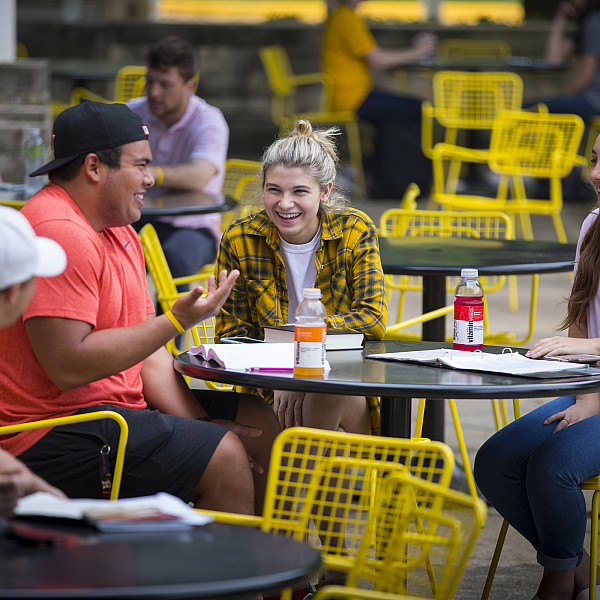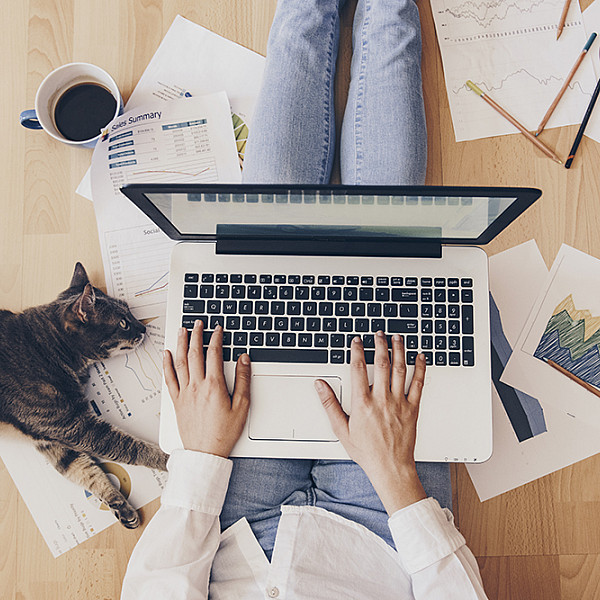News
Normal
Southwestern University students share their reflections on the COVID-19 crisis and the transition to remote learning.
May 01, 2020
May 01, 2020
Open gallery

Things are not normal. Schools have closed, stores have emptied (though there’s still plenty of food), and significant events—such as college commencement ceremonies—have been postponed indefinitely. Cities, states, and nations have turned inwards, imposing travel restrictions in a desperate attempt to limit the spread of COVID-19. Meanwhile, millions across the U.S. are finding themselves out of work, forced to navigate unemployment amid fragmented social circles. And as emergency measures put in place to slow the virus’s spread are criticized as both inadequate and authoritarian, the pandemic continues to claim lives. As of this writing, over 150,000 people have died of this disease.
Though we are all affected, everyone is experiencing this crisis differently. Some people are still going to work, putting themselves and their families at risk to keep critical services functioning. Others are staying at home—at best a mild inconvenience and at worst a devastating loss of income. For many of us, the chaos has strained tenuous physical, financial, and emotional situations, while for the immunocompromised, every interaction is potentially life-threatening.
As the Southwestern community navigates this pandemic, a number of students took the time to respond to five questions on how their lives and studies have been affected:
1) What’s been the hardest part of this pandemic and the containment measures in place?
2) What about it has been nice (if anything)?
3) What’s your biggest fear for the future (short- and/or long-term)?
4) What have you been reading/watching/doing while socially distancing? If you’re still working, how have things changed?
5) If you’re staying inside, what do you see outside your window right now? (Send a photo if you can.)
Their answers, unedited, are compiled below. Most responses were received the week of March 30 and any updates have been included in [brackets]. Though no five questions could fully capture this moment, and though these responses represent only a portion of Southwestern’s students and overall community, the following accounts highlight some of the hardships and anxieties we are all experiencing.
In the months ahead, sharing stories will prove just as important as masks and ventilators in helping the world weather this crisis. No matter what our circumstances, there are things we can do to support one another and be supported, but only if we speak up. COVID-19 may have fragmented our sense of normalcy, but it has not shattered our common humanity. And while the world reckons with failings in its medical, economic, and government systems, we, too, can take this harrowing opportunity to recognize and, when the dust settles, address the inequalities and other shortcomings in our communities. If nothing else, COVID-19 has made one thing clear: a threat to one of us is a threat to us all. We face enormous challenges in the coming decades, and just as fighting the coronavirus requires cooperation, so does building a sustainable future. We may be isolated now, but the best way forward is together.
Karonech Chreng ’20, Economics and Environmental Studies
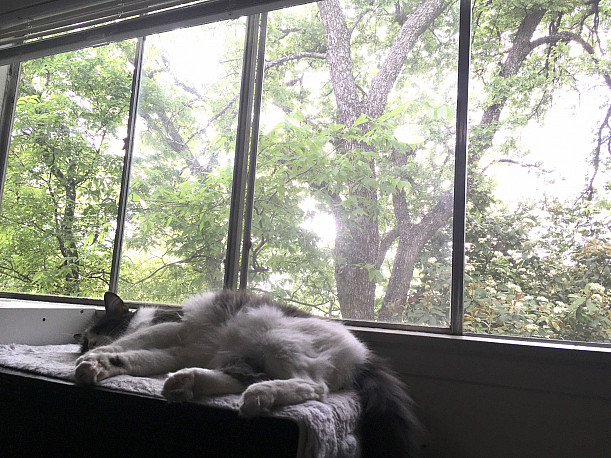
1) The worst thing is the uncertainty of the situation and the lack of unifying efforts in stopping the spread. During this, we are seeing polarization between classes; for example, white-collar workers who can/allowed to work from home vs. the blue-collar workers who are struggling.
The worst for me personally is since I work at retail, which is considered “essential”, I have constant internal conflict. Given that there are no limits from the local governments on the number of customers who can get into a store, I see a lax in enforcement in my store. Although I don’t feel as safe, given the number of people I come in contact with, I also have to worry about paying bills as well.
2) The best thing about it is social distancing. The situation is forcing people to utilize technology. There are lots of things that can be quickly done virtually, for example, going to the Dr. Office for RX refills.
I get to spend more time with my cats all the time.
3) The misunderstanding and miscommunication in the magnitude of the virus spreading will increase the number of mortality rates and hospitalization.
From Trump press conferences, he wants to open the country back up by Easter. I’m afraid that it is too soon. [The President has since extended social distancing guidelines through the end of April.]
4) I only watch press conferences from Trump and local governments only. I’m trying not to pollute my thoughts with opinion pieces since it’s already bad enough.
Anonymous
1) I am extremely privileged in a lot of ways when thinking about how COVID 19 is affecting my life. One of the hardest parts of this for me is seeing people’s complete disregard for at-risk lives. I keep hearing that it’s “just” older people and immunocompromised people who are dying. Aside from that not being true, so what? Are the lives of at-risk people, like mine, not valuable? Are they not worth protecting? There are people of all ages who could die from this and all of them matter.
2) Living with my disabilities/chronic illnesses, I am never sure what the future will look like. I might be fine one moment and headed to the ER the next. I have to cancel all sorts of plans last minute when my symptoms are more severe than I anticipated. I need accommodations and flexibility in my classes to allow for fluctuations in my health. So a lot of what is happening right now, I am used to. I’m used to not being able to do things I was really looking forward to. I’m used to having to figure out new ways to do schoolwork and get what I need out of my courses when stuck in the hospital or in bed at home. I’m used to not knowing how or when things will get better. The difference now, is that everybody is dealing with similar issues. Accommodations are suddenly normal and everyone is having to adapt to the changes. Professors are generally being more forgiving and flexible with all students. What is nice about this, is that there’s so much more understanding and support from the university (and society) than I’ve ever seen before.
The other possible positive is increased visibility for immunocompromised people. And maybe it will become more socially acceptable for people like me to wear face masks, not shake hands with others, and be extra careful to avoid germs.
My biggest fear is that I or someone I care about will die from this.
3) My biggest fear is that I or someone I care about will die from this. It’s scary being immunocompromised and also knowing so many others who are at-risk.
Erin Toro ’21, Biology and Psychology
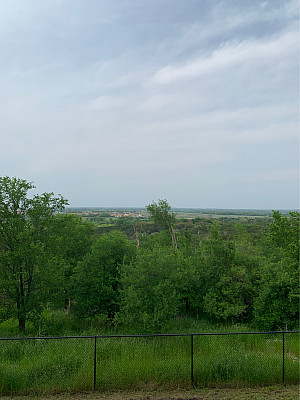
2) The best thing is having some newfound free time to get things done. Typically, at this time of year I would still be extremely busy.
3) My biggest fear for the future is that this isn’t an isolated event, and that the effects of this (on the economy, humanity) could last longer than expected.
4) I’ve been watching Netflix and YouTube videos for the most part, honestly. I’ve also been trying to keep up with the news.
Sam Buehler ’20, Economics and Environmental Studies
1) As a senior, there’s so many people I never got to say goodbye to, and may never see again. Even though they’re going to reschedule Commencement [the graduation ceremony for the class of 2020 will be held during homecoming weekend this coming fall] and there’s Homecoming and other events, there’s no guarantee that everyone can make it. It’s incredibly disappointing. And even though I’m a bit pleased that I don’t have to present at [Research &] Creative Works, it would have been nice to be able to share my Capstone with a lot of my friends and have that closure [the Research & Creative Works Symposium has moved online the week of April 20th]. Now I just have to do it from home, turn it in, and that’s that. It doesn’t feel the same, it’s a whole lot of work for nothing. Part of me wonders why I should even bother, but the responsible part makes me suck it up. Also, having to finish the last semester of my senior year at home, away from all my friends, away from the resources SU provides (the library, office hours, etc.)? It really, really sucks. I’m not the only one who’s cried a lot over this.
As a senior, there’s so many people I never got to say goodbye to, and may never see again.
2) I get to be home with my mom and keep her company in these stressful times, as well as her two dogs that I would absolutely die for. It’s nice to be home again, but I’ve lost a lot of the independence of college life. Not used to having someone judging me for procrastinating…
3) Job prospects. Graduating into a global recession (possibly even depression) means I won’t have near the number of potential jobs as those graduating before or after me, and it also means I’ll likely have lower wages for the rest of my life. That’s a little haunting. But really, I’m more scared for the people that don’t have the privilege I do. My parents are willing to keep supporting me if I’m unable to find a job and be financially independent in a year. So many others don’t have that support, and even if they did, their parents may not have the ability to support them.
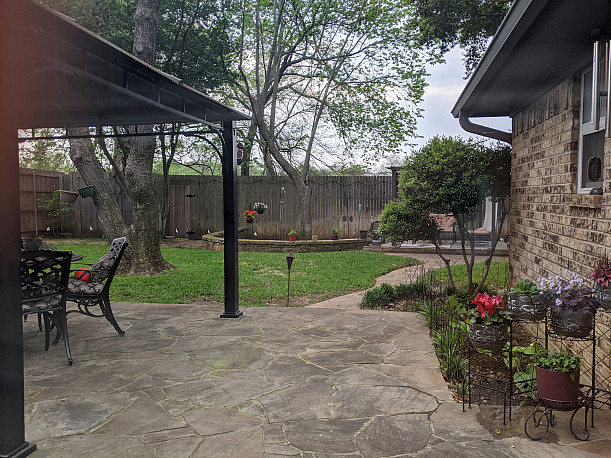
4) I’ve been playing Animal Crossing: New Horizons and avoiding all of my responsibilities. Hung out with some friends a lot before I got kicked off campus (we had all been together a lot before things went down, either we all had the virus or we didn’t, might as well social distance together). We basically did our own version of Senior Week and got some of the closure we needed.
5) My mom’s lovely backyard, that I’ll soon be doing some gardening in as a requirement for a class.
Nicole Rajtak ’22, Environmental Studies
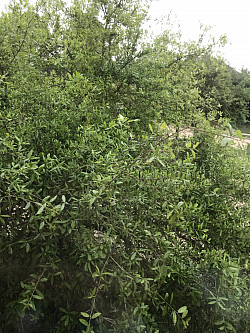
Anonymous
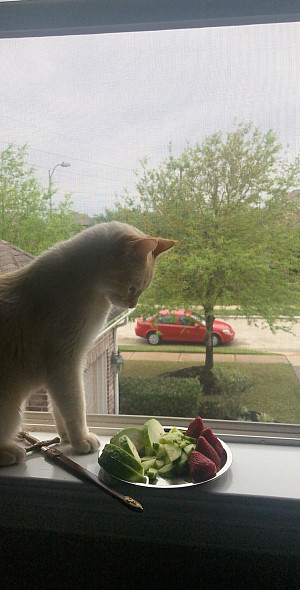
it’s hard because administration is working to mediate the situation but a lot of underlying processes are stopped too. personally, i appealed to live off campus next semester and also to file as financially independent. i was supposed to get the results of both of those motions by now but they haven’t because of everything. the frustrating part is that i can’t take out a lease on an apartment or financially stabilize because they just aren’t meeting because it’s “not a priority” anymore
2) Best: having more time to create, whether that’s knitting, drawing, or making music
3) Biggest fear for the future: long-term financial destabilization (on personal, national, and global levels)
4) Activities during break: i’ve been baking a LOT. honestly, it’s very stress relieving. beside who doesn’t love eating 32 cream puffs in a row. outside of that, i’ve been watching anime (fun) and the news (not as fun)
5) View from my window: my car n some pretty greenery
Saul Zuniga ’22, History
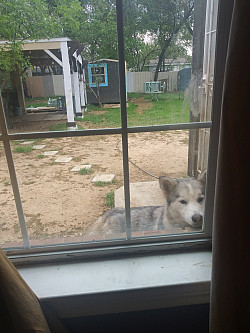
2) Adding on to the last point. The situation fits under the same historical trends of emerging diseases and will allow us to pinpoint the specific changes we need to make. Extra leisure time is cool too.
3) That this is forgotten about within a few years or that people miss a few important details regarding testing, diagnosing and treatment in a practical and historical sense. Dallas is scarier now too I guess.
4) Regarding the virus, I try to get my news primarily from the primary accounts of different social media videos which I can then use to search up articles written by journalists and scientists (which is the bulk of the readings). Non covid stuff, a book called Hate by a speaker who visited SU not too long ago [Hate: Why We Should Resist It with Free Speech, Not Censorship by former ACLU president Nadine Strossen].
5) The picture may have slightly been fabricated.
Ceanna Cooksey ’23, Environmental Studies and Political Science
1) Honestly, not being able to see my friends or really leave my house has been really hard. The tensions and being cooped up are making fighting more often in me and my friends’ houses. Everyone is really really stressed and scared for the future.
Everyone is really really stressed and scared for the future.
2) I’d say the break from school but even that’s not very good, we’re still doing school now and I’m unable to get my things from my dorm.
3) This is putting a lot of strain on relationships and mental health. I’m also worried about how the economy is handling things.
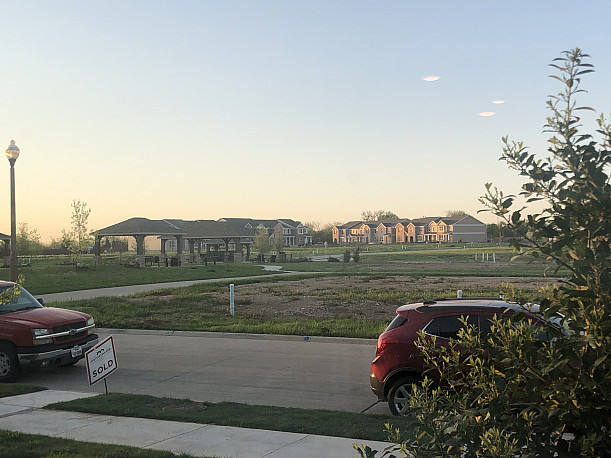
4) I’ve been playing Animal Crossing New Horizons. It’s a new game and from a favorite series of mine. The entire point is you’re just living in a happy little village, catching bugs and fish and talking to your neighbors, and it’s a needed escape from everything else right now. Nothing like a social simulation game when you can’t socialize :’)
5) My view is sidewalks and houses with no one outside. It’s almost creepy.
Anonymous
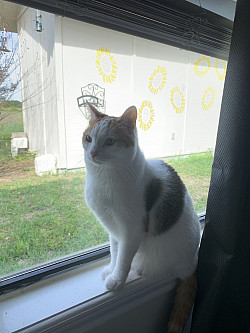
2) It has been nice to spend time with family and do things around the house that I have been wanting to do but didn’t have the time to do like gardening.
3) I had a job lined up for after I graduate and now I am not sure what is going to happen with that and the uncertainty of what my future looks like right now is a bit stressful.
4) Right now I am reading “I Know Why the Caged Bird Sings” by Maya Angelou. Throughout this quarantine I have been reading, crocheting, cooking, exercising, FaceTiming friends, and hanging with family. My internship changed since I can no longer go into work and since it is a very in person dependent job I had to come up with an independent project in place of my typical duties which is a big change from the rest of the semester.
5) And this picture is the window in my room. Outside is our gardening shed that I began to paint a mural on and my cat Pumpkin likes to sit on the windowsill and watch the birds eat at the bird feeder.
Abbey Lloyd ’20, Environmental Studies
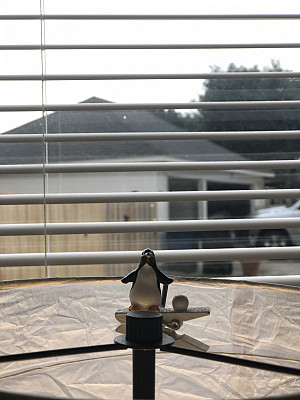
As a senior, a lot of things I cared a lot about have been postponed, such as graduation, but that is something that I am less stressed about.
2) Being home means I have access to food, a backyard, and a dog.
3) Just having access to tests, unknowingly spreading the disease, all the unknowns are what freak me out.
4) I am continuing my DC internship from home, but I feel like I lost a lot of the “DC experience,” like going to hearings and delivering letters to congressional offices. I’m supposed to be studying for the GRE’s, but I’ve been trying to learn the Mamma Mia soundtrack on guitar, as well as playing a lot of Mountain Goats songs. My 17 year old sister has been gracious enough to let me play Animal Crossing on her switch. I’ve also been baking like a madman.
Alex Bell ’21, Anthropology
1) The hardest part of this for me was having my study abroad program cancelled. I had arrived in Santiago, Chile on Feb. 21st and was planning to stay there participating in a Spanish language-immersion program through the School of International Training studying comparative education and social change in Chile and Argentina until June 8th. However, with the concern of international flights being halted completely and other potential risks surrounding the COVID-19 pandemic, I was required by Southwestern as well as my program coordinators to return home to the United States as soon as possible. The fact that I had to return so early after all the work I had done to make the opportunity a reality for myself was a frustrating and difficult realization to come to. However, I am extremely thankful for the people that I met and how I was able to learn and grow during the few weeks that I did spend in Chile. I arrived back in Houston on March 18th and have been self-quarantining at my apartment in Georgetown since and, unfortunately, have not been able to see my grandmother, who I am very close with, because she is in the high risk population.
I am extremely thankful for the people that I met and how I was able to learn and grow during the few weeks that I did spend in Chile.
2) It’s been kind of nice to slow down and just chill with myself and the people I live with, but at the same time we know it’s for all the wrong reasons. Even though it’s sometimes ideal to not really have anything that I need to do, there’s always this underlying stress that I should be doing more.
3) My biggest short-term fear is that I may not receive financial aid when I return to Southwestern in the fall because I decided to drop out of my study abroad program entirely after the in-person component was cancelled. Personally, I was not interested in being in debt for a semester “abroad” in Latin America in which I would have completed a majority of the coursework online from my apartment in Georgetown, TX, so I will be using the partial refund that I receive from the program to pay back the loans I took out and hopefully using what is left over to put myself in a more comfortable financial situation since I have been without any income since I returned. While I did not need the credits for this semester in order to still graduate on time, dropping out puts me in danger of not meeting Standard Academic Progress (SAP) standards which determine a student’s eligibility for financial aid. I have been informed by the financial aid office that there is an appeal process for extenuating circumstances such as the ones that we are all experiencing right now, so I am hopeful that my particular situation will not cause a significant financial barrier for me in completing my final year at SU, but I won’t know for sure until May.
Long-term, I am terrified/(excited for?) what this whole pandemic means for the global anti-capitalist movement/revolution. The government is pulling trillions out of their asses to supplement income for the working-class. They’re talking about releasing “low-risk” incarcerated folks. We’re finally seeing on an enormous scale the need for universal healthcare, not just in the United States, but globally. We’re starting to see how connected we are as human beings and how much we often take that connection for granted. I could go on but it’s kind of stressful to think about the fact that so many people are suffering and the President and other public “servants” want to see this virus worsen for the sake of upholding the white-supremacist, capitalist economy.
We’re starting to see how connected we are as human beings and how much we often take that connection for granted.
4) I’ve been reading “I shimmer sometimes, too” a poetry collection by Porsha Olayiwola and re-watching Bojack Horseman, Steven Universe, and She’s Gotta Have It.
5) I am really feeling too lazy to get up and go take a picture of the view of my window, plus it’s just a parking lot. lol.
Brooke Gruthrie ’22, Environmental Studies
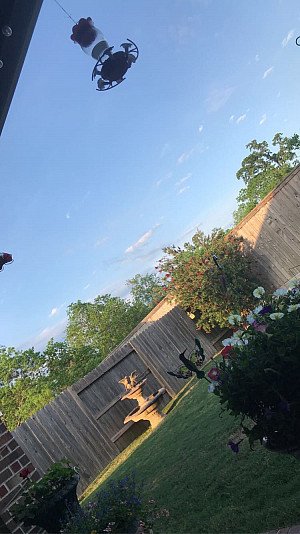
2) However, before this virus, I would have been in Georgetown right now, three and a half hours away from my mom in Houston. So despite the horror of this virus, I’m also thankful I’m able to take care of her, otherwise while her partner is at work during the day, she would be alone. I’m at peace knowing for the next few months, I’m able to make sure she’s okay and be by her side physically.
3) My biggest fear for the future short term is losing my mom. Long term, my biggest fear is losing myself. Not so much by death, but by letting this world event consume me. I’m using every bone in my body to remain positive because that’s my biggest strength, but even that doesn’t feel like enough sometimes. I know for sure that once this pandemic is over, I’ll appreciate everything so much more, and live my life to the fullest.
I know for sure that once this pandemic is over, I’ll appreciate everything so much more, and live my life to the fullest.
4) I’ve been watching The Circle, I feel like it’s pretty relevant since the world is so connected by social media right now. I’ve been reading a lot because it gives me an escape from reality. I’m reading a book for my philosophy class called I, Tituba. I’m also reading my favorite book, Jurassic Park, and plan on rewatching the movie for the millionth time. I’ve been going on daily walks to keep me at peace, and treating myself to lots of bubble baths, facemasks and yoga. While I’m doing my homework, I listen to my favorite music and cuddle with my mini labradoodle Bowie (named after David Bowie, my favorite artist. R.I.P). I hope Bowie will make an appearance in one of my google hang out class sessions, he’s very needy so I’m sure he will. Overall, I feel like I’ve been making a better effort to take care of myself to keep my spirits up.
5) I spend time by the window in the living room to stay close to my family, and I have an excellent view of our backyard that my mom treasures so much. She loves birds, and gardening so there’s lots of flowers and bird feeders. Since we’re transitioning into spring, I’ve had my eyes peeled for birds, in particular hummingbirds because they’re my favorite. I love them so much that I literally have a tattoo of one on my ankle!
Anonymous
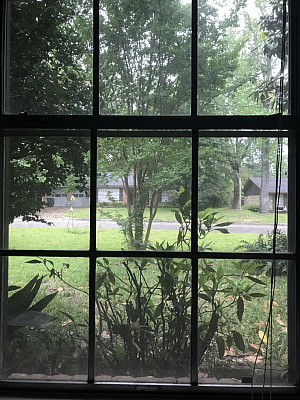
2) The pandemic has given me more free time, which is a mixed blessing. There are so many things I could do, including schoolwork, but it’s hard to muster the motivation to do them. I’ve drawn a little, read a lot, and planted some watermelons. My best friend and I have been playing games over the phone and computer and I’m so grateful for her. Also, since there have hardly been any cars on the streets in my neighborhood, things are morbidly peaceful here. I haven’t been home for spring since I started college and it’s nice to see everything green and in bloom before the summer heat sets in.
3) More than anything, I’m afraid for my mom’s future and my grandparents’ health. My mom has been trying to get out of my hometown for years, but now that the market’s crashed, she’s lost a big chunk of her retirement savings and isn’t sure she’ll be able to find a job somewhere else. My grandparents, all still alive, are at high risk from the virus and it makes me so angry when I hear people playing down the threat or putting economic productivity over lives. I am also afraid of starting my career in a global recession—or even a depression—and how that will impact my future. But most of all, I am afraid that the immediacy of this crisis will distract us from long-term action on climate change. The virus doesn’t change the fact of global warming and ecosystem degradation; if anything, it has shown the unsustainability of our economic system and the need for change. But seeing that lawmakers are using the pandemic as an excuse to roll back environmental regulations, things aren’t looking good.
I am afraid that the immediacy of this crisis will distract us from long-term action on climate change.
4) My mom and I have been watching The Good Place and I’m really enjoying it, especially the ethical questions they introduce. We’re also doing some gardening and will (hopefully) have a bunch of produce come summer. I’m still working for my campus job, though at reduced hours. There’s only so much we can do online.
Anonymous
As a student living on their own, working 30+ hours a week to afford my bills and education, and not near my family/yearlong friends for a support network, the virus and switch to online classes on top of unemployment looming, I can barely focus, and I as well barely care.
I’ve also experienced another shutdown of a school. My last college actually closed. Spring of 2019. It’s actually been kind of haunting experiencing this one year later.
1) The hardest part… having to restructure my life entirely without any warning, and to have everyone around me doing the same. We can’t even fully lean on each other in a time like this. We all have to be so resilient. Nobody has ever dealt with something like this before and the complete stress and paranoia is overwhelming.
I’ve had my life turned upside down before, when my first uni shut down. That was more emotionally frustrating, and most of my support network was struggling too, but I still had family and friends that weren’t experiencing the hardship that were critical to helping me push myself forward.
2) I’m not gonna lie the extended break gave me time to play animal crossing before going back to classes so that’s been nice… and there’s less traffic, since I live in round rock and commute to work
3) Short term fear… simply job stability. I’m fully putting myself through college and my apartment. Long term fear…. that nothing will change from this. Our government has shown that they can provide us with medical and financial support at no cost to us. We as a nation have a chance to hold that accountable. Also, I’m not vegan, but this virus is a prime example of how our consumption of animals needs to lessen or be regulated for humane and respectful treatment.
4) I’ve been playing video games for the first time in a while. Spending more time with my roommate. More time on social media and news bc of the virus. I work at a pizza place, and there’s only 3 workers now usually, and it’s almost all online orders so it’s really quiet.
I hate the term social distancing, btw. We can still socialize and communicate and help each other. It’s Physical distancing we’re needing.
I saw a group of teenagers behind my apartment complex the other day. They were standing really far apart, or sitting in the field, etc. I thought it was really weird, then realized they were following the 6 ft distance. But they were still hanging out. It reminded me of sleepovers when I was a teen, and we’d spend some time all just on our phones existing together at some point. They were doing the same. It was crazy.
















